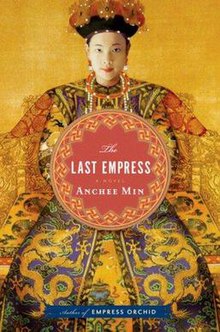Plot summary
The story begins with the death of Orchid's mother. Empress Orchid's son Tung Chih is also beginning to hate her, much to her despair.
In 1849, the Selection of Imperial begins for him is completed. The chosen Empress is a "cat-eyed, eighteen-year-old beauty" called Alute. Orchid's preferred selection for Empress was the daughter of a provincial governor named Foo-cha. It was only due to Empress Nuharoo's rank as the higher wife that Alute was chosen.
The Selection of Imperial is followed by the suspicious death of Orchid's close friend and eunuch An-te-hai. His death had a great emotional impact on Empress Orchid.
Around one year later, tension begins to mount between Orchid and Alute. Orchid becomes irritated at Alute's lack of co-operation, and is further annoyed with Alute's rude attitude towards her. Her annoyance soon turns to happiness when Alute claims that she is pregnant with Tung Chih's first child. Tung Chih's illness worsens and in 1875 he dies with his mother beside him. Empress Orchid refuses to give up her power, as she believes that Alute only sees the "glamour and glory" of being an Empress. As well as this, she also believes that Alute has little experience with political and court matters – thus rendering her unsuitable for the role as Empress of China.
Orchid also realises that Alute may have been mentally disturbed. Yet these possibilities had no effect on foreign journals describing Orchid as a violent character who contributed to the death of her son – whilst portraying Alute as the protagonist of the event. Many foreign reports and articles soon begin printing false reports of Orchid's actions as ruler of China, suggesting that she is solely responsible for China's decline due to her cruel regime. However, such stories are seemingly published only to justify further invasions of China.
After the death of Tung Chih and Alute, Orchid adopts her sister Rong's son Tsai-t'ien. Orchid then renames her nephew Guang-hsu upon his succession to the Dragon Throne. Initially, Orchid felt no motherly love for her nephew as she only adopted him to prevent his death at Rong's hand. However, a mother-son bond eventually forms between the two.
Shortly after the appointment of Guang-hsu as Orchid's successor, her love Yung Lu announces that he is planning to marry and move away to faraway Sinkiang. Soon after Orchid realises that she is no longer at full health, she receives information that Empress Nuharoo has collapsed from illness. Nuharoo dies, and rumours suggest that Orchid is responsible.
Several years later (after increasing attacks by foreign countries), Orchid and Guang-hsu move to Ying-t'ai. An assassination attempt is made on her life. After Guang-hsu learns of the mistake he made that almost cost Orchid's life, he becomes deeply shamed and loses the will to live. His attempted reform of China also fails, and he too succumbs to illness. Attacks by a rebellion group named the Boxers soon force Orchid, Guang-hsu and their servants to flee. They return to the Forbidden City after the attacks subside.
From this point, Orchid's health deteriorates further. During this time, she meets with Robert Hart, an important contributor to the stability of China's economy. On November 14, 1908, Emperor Guang-hsu dies. Orchid also dies the following day, after appointing her grandnephew Puyi as her successor.

Sun Quan, courtesy name Zhongmou (仲謀), posthumously known as Emperor Da of Wu, was the founder of the Eastern Wu dynasty, one of the Three Kingdoms of China. He inherited control of the warlord regime established by his elder brother, Sun Ce, in 200. He declared formal independence and ruled from November 222 to May 229 as the King of Wu and from May 229 to May 252 as the Emperor of Wu. Unlike his rivals Cao Cao and Liu Bei, Sun Quan was much younger than they were and governed his state mostly separate of politics and ideology. He is sometimes portrayed as neutral considering he adopted a flexible foreign policy between his two rivals with the goal of pursuing the greatest interests for the country.

Cao Zhi, courtesy name Zijian, posthumously known as Prince Si of Chen (陈思王), was a prince of the state of Cao Wei in the Three Kingdoms period of China, and an accomplished poet in his time. His style of poetry, greatly revered during the Jin dynasty and Southern and Northern Dynasties, came to be known as the Jian'an style.

The Tongzhi Emperor, also known by his temple name Emperor Muzong of Qing, personal name Zaichun, was the ninth emperor of the Qing dynasty, and the eighth Qing emperor to rule over China proper. His reign, which effectively lasted through his adolescence, was largely overshadowed by the rule of Empress Dowager Cixi. Although he had little influence over state affairs, the events of his reign gave rise to what historians call the "Tongzhi Restoration", an unsuccessful modernization program.
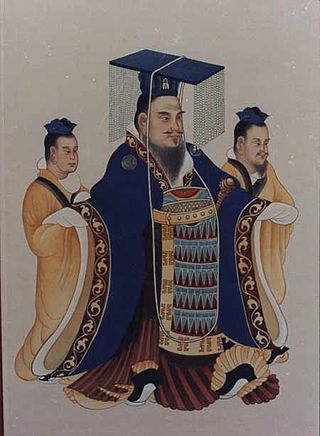
Emperor Wu of Han, born Liu Che and courtesy name Tong, was the seventh emperor of the Han dynasty from 141 to 87 BC. His reign lasted 54 years – a record not broken until the reign of the Kangxi Emperor more than 1,800 years later – and remains the record for ethnic Han emperors. His reign resulted in a vast expansion of geopolitical influence for the Chinese civilization, and the development of a strong centralized state via governmental policies, economical reorganization and promotion of a hybrid Legalist–Confucian doctrine. In the field of historical social and cultural studies, Emperor Wu is known for his religious innovations and patronage of the poetic and musical arts, including development of the Imperial Music Bureau into a prestigious entity. It was also during his reign that cultural contact with western Eurasia was greatly increased, directly and indirectly.

Emperor Yuan of Han, personal name Liu Shi, was an emperor of the Chinese Han dynasty. He reigned from 48 BC to 33 BC. Emperor Yuan promoted Confucianism as the official creed of the Chinese government. He appointed adherents of Confucius to important government posts.

Empress Xiaozhenxian, of the Manchu Bordered Yellow Banner Niohuru clan, was a posthumous name bestowed to the wife and empress consort of Yizhu, the Xianfeng Emperor. She was empress consort of Qing from 1852 until her husband's death in 1861, after which she was honoured as Empress Dowager Ci'an.

Emperor Wen of Sui, personal name Yang Jian (楊堅), Xianbei name Puliuru Jian (普六茹堅), alias Narayana deriving from Buddhist terms, was the founding emperor of the Chinese Sui dynasty. As a Buddhist, he encouraged the spread of Buddhism through the state. He is regarded as one of the most important emperors in Chinese history, reunifying China proper in 589 after centuries of division since the independence of the Cheng-Han and Han-Zhao dynasties from the Western Jin dynasty in 304. During his reign, the construction of the Grand Canal began.

Emperor Yang of Sui, personal name Yang Guang (楊廣), alternative name Ying (英), Xianbei name Amo (阿摩), was the second emperor of the Sui dynasty of China.
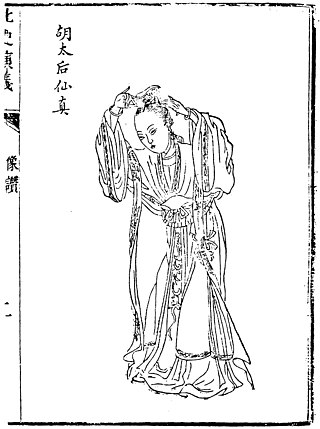
Empress Dowager Hu, formally Empress Ling (靈皇后), was an empress dowager of the Xianbei-led Chinese Northern Wei dynasty (515-528). She was a concubine of Emperor Xuanwu, and she became regent and empress dowager after her son Emperor Xiaoming became emperor after Emperor Xuanwu's death in 515. She was considered to be intelligent but overly lenient, and during her regency, many agrarian rebellions occurred while corruption raged among imperial officials. In 528, she was believed to have poisoned her son Emperor Xiaoming after he tried to have her lover Zheng Yan (鄭儼) executed. This caused the general Erzhu Rong to attack and capture the capital Luoyang. Erzhu threw her into the Yellow River to drown.
Emperor Xiaoming of (Northern) Wei ( 魏孝明帝), personal name Yuan Xu (元詡), was an emperor of the Xianbei-led Chinese Northern Wei dynasty. He ascended the throne in 515 at the age of five, and governmental matters were dominated by his mother Empress Dowager Hu. In 528, Emperor Xiaoming tried to curb his mother's powers and kill her lover Zheng Yan (鄭儼) by conspiring with the general Erzhu Rong. As a result, the 18-year-old emperor was poisoned by his mother, who was soon overthrown by Erzhu. From that point on, Northern Wei royal lineage had no actual power. The next ruler, Emperor Xiaozhuang (507–531) was established by Erzhu. Since Erzhu's rival, general Gao Huan, enthroned another royal offspring, the country was soon split in two rival polities, Eastern and Western Wei, both of which did not hold long on the political map of the Southern and Northern Dynasties.
Lu Lingxuan (陸令萱) was a lady in waiting in the palace of the Chinese Northern Qi dynasty. As she served as the wet nurse to the emperor Gao Wei, she became exceedingly powerful during his reign, at times eclipsing in importance his mother Empress Dowager Hu and was often criticized by historians for her corruption and treachery.
Dugu Qieluo or Dugu Jialuo, formally Empress Wenxian (文獻皇后), was an empress of the Chinese Sui dynasty. She was the wife of Emperor Wen, who, on account of his love and respect for her, as well as an oath they made while they were young, did not have any concubines for at least most of their marriage, an extreme rarity among Chinese emperors. However, she had a bipolar personality that made it difficult to judge her, sometimes cruel and domineering and sometimes kind and unassuming. But was exceedingly powerful and influential during her husband's reign and assisted the emperor in running the empire. She was heavily involved in his decision to divert the order of succession from their oldest son Yang Yong to the second son Yang Guang, and her influence in changing the succession eventually led to the fall of the Sui dynasty.
Forbidden City: Portrait of an Empress is a Singapore musical that tells the story of China's Legendary Empress Dowager Cixi. It was staged by the Singapore Repertory Theatre originally on 17–19 October 2002 at the Esplanade - Theatres on the Bay, as part of its opening festival, and back again in 2003 by popular demand and in 2006 as part of the IMF meetings in Singapore. Forbidden City was developed by Stephen Clark, Dick Lee and Steven Dexter. It was staged once again in August 2017 at the Esplanade - Theatres on the Bay.
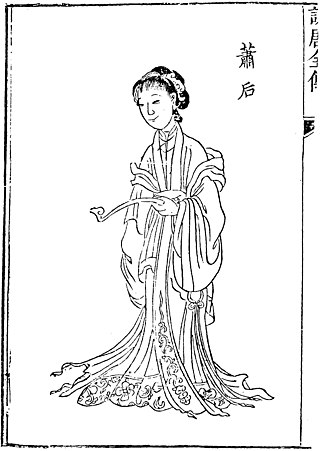
Empress Xiao, formally Empress Min, was an empress of the Chinese Sui dynasty. Her husband was Emperor Yang of Sui.

Empress Orchid (2004) is a novel by Anchee Min which was first published in Great Britain in 2004. It is written in first person and is a sympathetic account of the life of Empress Dowager Cixi - from her humble beginnings to her rise as the Empress Dowager.
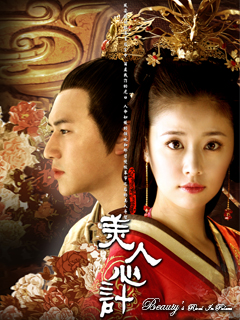
Beauty's Rival in Palace is a 2010 Chinese television series adapted from Xiao Qiying's short story Turbulence in the Empress' Chamber (未央沉浮). It was first broadcast on Shanghai TV Drama on 15 March 2010. The series was one of the highest-rated Chinese TV series in 2010.

Autumn's Concerto is a 2009 Taiwanese drama series starring Ady An, Ann Hsu, and Vanness Wu of F4. It was produced by Sanlih E-Television and directed by Chen Wei-ling. The series was filmed from June to December 2009.
Empress Fu, posthumously Empress Xuanyi (宣懿皇后) was an empress consort of the Chinese Later Zhou dynasty during the Five Dynasties and Ten Kingdoms period. She was invested the empress in 954 when her husband Guo Rong became the second Later Zhou emperor. Three years after her death, Guo Rong married her younger sister when he fell critically ill.
Empress Fu was an empress consort and empress dowager during the Later Zhou dynasty. She was a daughter of general Fu Yanqing and a younger sister of Empress Xuanyi, who was married to the Later Zhou emperor Guo Rong from 951 or so to 956. Guo Rong had been without a wife ever since Empress Xuanyi's death in 956, and he married the younger Fu in July 959 when he fell critically ill. The marriage was clearly political and most likely not consummated: Guo Rong died 10 days later and was succeeded by his 6-year-old son Guo Zongxun. Empress Dowager Fu as his guardian became the regent.
Hsu Tung-chih was a Taiwanese serial killer who killed at least seven people, including two girlfriends, from 1976 to 1983. Convicted, sentenced to death and subsequently executed for these killings, he is regarded as one of the worst murderers in the country's history.
